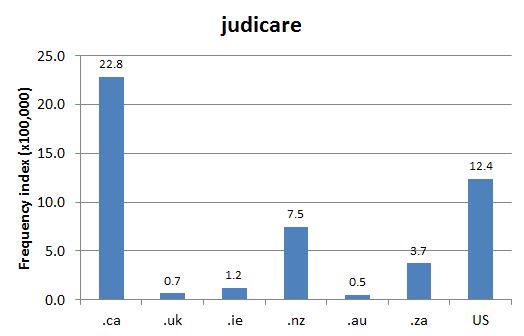DCHP-2
judicare Judicare DCHP-2 (October 2016)
n. & adj. — Law, Administration
a type of legal aid whereby clients choose their own private lawyers who are funded by the provincial government.
Type: 5. Frequency — In Canada, judicare refers to a type of legal aid plan whereby eligible underprivileged clients receive legal services from a private lawyer of their choice (see the 1995 and second 2010 quotations). These private lawyers are then compensated by the provincial government for their services. The judicare system is contrasted with the "staff" system, whereby clients are assigned salaried public defenders (see the 1982 quotation). The judicare model is one of three broad types of legal aid in Canada, alongside the aforementioned "staff" system and the "mixed" (staff-judicare) system.
The term judicare is said to have been coined in 1956 by Phillip S. Habermann, an American lawyer from Wisconsin (Habermann 1971: 307), who defined the term as a type of legal plan whereby persons of low income are able to "choose their attorney, who performs the services required and is paid from government funds" (Habermann 1971: 306). OED-3 marks the term as originally from the US (see OED-3, s.v. "judicare"). The term is said to be modelled on the concept of "medicare" (see COD-2, s.v. "judicare"). As seen in Chart 1, the term is today most frequently used in Canada.
See also COD-2, s.v. "judicare", which is marked "Cdn".See also: medicare
- The term judicare is often used attributively, such as "judicare model", "judicare system" or "judicare program".
References:
Images:
Chart 1: Internet Domain Search, 30 Aug. 2013
